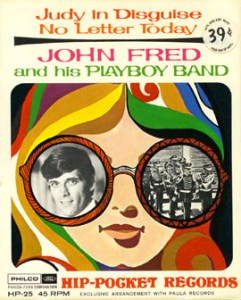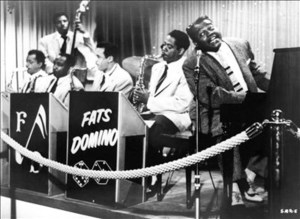 Gonzaga University’s radio station came to life while I was a student there. Broadcasting from a corner of the COG (Center of Gonzaga) student union building’s basement, the shoestring operation operated with used equipment and neophyte enthusiasm. The station’s disc jockeys – I was one – played the popular music of the day, mixed in with whatever else we felt other students needed to hear.
Gonzaga University’s radio station came to life while I was a student there. Broadcasting from a corner of the COG (Center of Gonzaga) student union building’s basement, the shoestring operation operated with used equipment and neophyte enthusiasm. The station’s disc jockeys – I was one – played the popular music of the day, mixed in with whatever else we felt other students needed to hear.
“Judy in Disguise (With Glasses)” by John Fred and His Playboy Band was Billboard’s number one record for two weeks in early 1968. “Judy in Disguise” was either homage to or parody of the Beatles “Lucy in the Sky with Diamonds.” Both had lyrics that probably made sense when you were stoned. John Fred’s follow-up “Hey Hey Bunny,” made it to number 57. Subsequent releases sank without a ripple and “Judy in Disguise” is remembered as a novelty curiosity and John Fred as a prototypical One-Hit Wonder.
John Fred Gourrier was born in Baton Rouge Louisiana. He began playing in bands while a teenager. John Fred and the Playboys performed at local dances, sometimes sharing the bill with John Ramistella, later known as Johnny Rivers. Gourrier was also the star of his high-school basketball team.
 The teenaged John Fred cut his first record at Cosimo Matassa’s legendary J & M Studio in New Orleans. Fats Domino had just finished “Whole Lotta Lovin’,” and the band stayed around to back Fred on his song “Shirley.” The record made it to 82 on Billboard’s Hot 100 and led to an appearance on Alan Freed’s radio show. Fred turned down an appearance on Dick Clark’s American Bandstand because his team was playing in the Louisiana state high-school basketball championship.
The teenaged John Fred cut his first record at Cosimo Matassa’s legendary J & M Studio in New Orleans. Fats Domino had just finished “Whole Lotta Lovin’,” and the band stayed around to back Fred on his song “Shirley.” The record made it to 82 on Billboard’s Hot 100 and led to an appearance on Alan Freed’s radio show. Fred turned down an appearance on Dick Clark’s American Bandstand because his team was playing in the Louisiana state high-school basketball championship. Ten years later, “Judy in Disguise (With Glasses)” hit number one, displacing the Beatles’ “Hello Goodbye” from that position.
Ten years later, “Judy in Disguise (With Glasses)” hit number one, displacing the Beatles’ “Hello Goodbye” from that position.
Fred spent the seventies touring small clubs and did some production work for Irma Thomas. He coached high-school basketball, had a Baton Rouge radio show. In later years he wrote commercial jingles for Greyhound Bus and the Dallas Mavericks, among others. He continued playing clubs and casinos until prevented by health. He died in 2005 of complications from a kidney transplant.
The Oxford American magazine’s annual Southern Music issue is out. You should buy it.